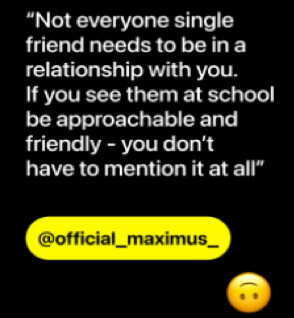Take Action
How you can help amplify important dialogue about rejection
SHARE YOUR EXPERIENCE
Sharing your experience of rejection can help people reflect on uncomfortable and awkward experiences and manage it better next time.
Young men often don't share their experiences of rejection with others before they experience it for themselves the first time. It’s important for all genders to know that rejection is normal and doesn’t reflect your worth.
By showing what you’ve learnt personally – or the best advice you’ve received – you’re helping others know it’s normal, okay and they’re not alone.

IDEAS
Tips for ‘leaving it on good terms’ – how do you care for the person doing the rejecting?
Share your ‘Rule of 3’ tips on self-care – what three things do you do to look after yourself if you’ve been rejected? e.g. talk to a friend or family member, or go for a run…
Share a time when you felt respected for saying no and how that felt.
Tools
- Pablo by Buffer (Free)
- Canva (Free, with Paid Options)
- Desygner (Free, with Paid Options)
- Snappa (Free, with Paid Options)
MAKE MEMES
Everyone gets rejected, regardless of their gender. Make a funny meme to pull apart unhelpful gendered stereotypes and share your point of view.
Stereotypes make it harder to talk to each other, or to our mates, about the potentially uncomfortable stuff when rejection happens – and that’s not okay.

IDEAS
Rework cliqued rejection memes like ‘Bye Felipe’, ‘Denied Encino Man’ and ‘Friendzoned Johnny’ or ‘Worst She Can Say Is No’. You could try replacing the negative image with a positive one to flip the meaning of it
Edit phrases of popular memes counter the stereotypes. We suggest Obi-Wan Kenobi’s ‘Hello There’ or Lord of the Rings ‘One Does Not Simply’.
Experiment with ASMR videos by finding a clip of two people arguing – for example from a reality TV show - and record over the original audio with a ‘healthier’ interaction about rejection!
Tools
- ImgFlip Meme Generator (Free)
- Live Meme (Free)
- Canva (Free, with Paid Options)
- Imgur (Free, with Paid Options)
- Wondershare Filmora Meme Maker (Free, with Paid Options)
CREATE AUDIOGRAMS
Why not record yourself giving tips based on the ‘Crushed But Okay’ video themes – Not Interested, Friendzoned, A Clear ‘No’ and Compliments Gone Wrong. Hear our team of Creative Advisors share their thoughts as audiograms and check out their bios in the participants pagePosting tips
Tag your content using #CrushedButOkay to show your support for the Foundation's campaign
Check copyright status images if you haven’t used your own. You can find millions of public domain images (with Creative Commons licence) in Openverse
Avoid memes from sites like 4Chan, where often content meaning can be hijacked and harmful content goes viral
If you find any content upsetting or triggering, visit the Foundation's Community Safety page for support services contact information, or talk to a trusted adult.
Safety
These suggested activities aim to help young people - especially young men - develop resilient responses to hearing 'no'. Sometimes reactions to rejection & disappointment cross the line and cause real harm. If you or a friend experience harm online, you can get help here:
- Report online abuse in-app or to the platform you’re using, and seek advice from Office of the eSafety Commissioner
- Read more about the signs of abuse, 1800 Respect Online Safety advice.
- Get help and advice from 1800 Respect (call 1800 737 732 or chat), Kids Helpline (call 1800 55 1800 or chat, connect with ReachOut NextStep chat.